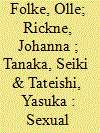|
|
|
Sort Order |
|
|
|
Items / Page
|
|
|
|
|
|
|
| Srl | Item |
| 1 |
ID:
110545


|
|
|
|
|
| Publication |
2011.
|
| Summary/Abstract |
Does control of patronage jobs significantly increase a political party's chances of winning elections in U.S. states? We employ a differences-in-differences design, exploiting the considerable variation in the dates that different states adopted civil service reforms. Our evidence suggests that political parties in U.S. states were able to use state-level patronage to increase the probability of maintaining control of state legislatures and statewide elective offices. We also find that an "entrenched" party, in power for a longer time, can use patronage more effectively. We consider several alternative hypotheses that might plausibly account for the patterns in the data, but find no evidence to support them.
|
|
|
|
|
|
|
|
|
|
|
|
|
|
|
|
| 2 |
ID:
148661


|
|
|
|
|
| Summary/Abstract |
In this analysis of how electoral rules and outcomes shape the internal organization of political parties, we make an analogy to primary elections to argue that parties use preference-vote tallies to identify popular politicians and promote them to positions of power. We document this behavior among parties in Sweden's semi-open-list system and in Brazil's open-list system. To identify a causal impact of preference votes, we exploit a regression discontinuity design around the threshold of winning the most preference votes on a party list. In our main case, Sweden, these narrow “primary winners” are at least 50% more likely to become local party leaders than their runners-up. Across individual politicians, the primary effect is present only for politicians who hold the first few positions on the list and when the preference-vote winner and runner-up have similar competence levels. Across party groups, the primary effect is the strongest in unthreatened governing parties.
|
|
|
|
|
|
|
|
|
|
|
|
|
|
|
|
| 3 |
ID:
171118


|
|
|
|
|
| Summary/Abstract |
Sexual harassment is more prevalent for women supervisors than for women employees. This pattern holds in the three countries we studied – the United States, Japan, and Sweden – where women supervisors are between 30 to 100 percent more likely to have been sexually harassed in the last twelve months. Among supervisors, the risk is larger in lower- and mid-level positions of leadership and when subordinates are mostly male. We also find that harassment of women supervisors happens despite their greater likelihood of taking action against the abuser, and that supervisors face more professional and social retaliation after their harassment experience. We conclude that sexual harassment is a workplace hazard that raises the costs for women to pursue leadership ambitions and, in turn, reinforces gender gaps in income, status, and voice.
|
|
|
|
|
|
|
|
|
|
|
|
|
|
|
|
|
|
|
|
|